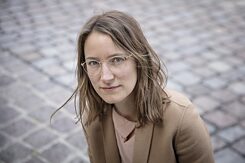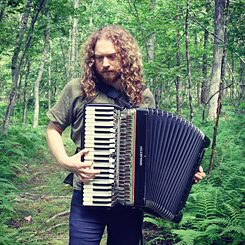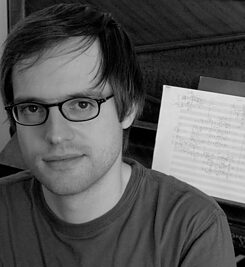New Music by Catherine Lamb, Carl Bettendorf, and Ben Richter
New York’s Ghost Ensemble fosters groundbreaking music that blurs borders of genre, style, and scene, expanding perceptual horizons through shared immersive experience. Ghost Ensemble’s performance presents new works created in collaboration with Catherine Lamb, Carl Bettendorf, and Ben Richter.
Catherine Lamb’s interius/exterius (2022) explores multi-dimensional harmonic space, investigating how collective intentions or focal points allow various and sometimes unusual pathways to emerge. As the group links together in phase, the greater web of activity aligns intention and desire within a community of musicians sounding together, the initiation of sound constantly shifting, unfolding new sonic dimensions.
Ben Richter’s Rewild (2022), inspired by nonhuman perspectives and distant orders of magnitude in the universe of life, traverses the thresholds at which pitch becomes rhythm, harmonic interval becomes beating rate, and timbres morph over time. By offering an aural metaphor for the interacting gradual processes of quantum and cosmic systems, Rewild’s pulsing, breathing sonic ecosystem aims to auralize the vast and infinitesimal timescales we do not experience in everyday life.
Carl Bettendorf’s Variations on 4x25 Notes (2023) returns to an older sketch as an objet trouvé to explore musical material through the lens of the time that has passed, using this rediscovered sound as a means to question place, language, translation, and memory.
Critics have praised Ghost Ensemble performances as “prodigious … a thrilling listen” (Christian Carey, Sequenza21), “wonderful work … both exhilarating and a bit scary” (Peter Margasak, Bandcamp Daily), “beautifully performed and recorded … a body-felt sound mass … a multifaceted texture that evokes the primeval” (Meg Wilhoite, Sound Meets Sound), and “cloudy, mysterious, and dark … Beckettian in its slow spread … certainly a group to keep an eye on” (Brian Olewnick, Just Outside).
WORKS:
Catherine Lamb’s interius/exterius, composed in close collaboration with the musicians of Ghost Ensemble through the 2021-22 season, investigates how collective intentions or focal points allow various and sometimes unusual pathways to emerge. As the group links together in phase, the greater web of activity aligns intention and desire within a community of musicians sounding together, the initiation of sound constantly shifting, unfolding new sonic dimensions.
This commission has been made possible by the Chamber Music America Classical Commissioning Program, with generous funding provided by The Andrew W. Mellon Foundation.
Ben Richter’s Rewild traces the fragile evolution of a shadow biosphere, inspired by the perspectives and timescales of nonhuman beings. Seeking new strata in musical parameters, Rewild stretches acoustic elements across perceptual thresholds to distant orders of magnitude — the quantum foam susurrations of yoctomusic, the cosmological flux of yottamusic. Exploring the uncanny zones at which pitch becomes rhythm, harmonic interval becomes beating rate, and timbres morph over time, the pulsing, breathing sonic ecosystem orients temporal perception toward global listening in a sound-world of constant transformation. By modeling the interacting gradual processes of quantum and cosmic systems, Rewild aims to auralize the vast and infinitesimal timescales we do not experience in everyday life.
Carl Bettendorf’s Variations on 4x25 Notes returns to an older sketch as an objet trouvé to explore musical material through the lens of the time that has passed. The composer writes, “I went back to a one-minute musical ‘salute’ that I wrote for the 25th anniversary of a workshop for young composers in Weikersheim, Germany, which I attended throughout my high-school years. I had transcribed the letters of the name of the location into music, although I only used the common letter names (and I also made a small mistake). In the variations, I have ‘corrected’ that mistake and expanded the pitch material by transcribing the remaining letters using Messiaen’s language communicable, eventually branching out even further … I was intrigued by the instrumentation of the ‘found’ miniature and its sonic possibilities.”
BIOS:
Ghost Ensemble fosters groundbreaking music that blurs borders of genre, style, and scene, expanding perceptual horizons through shared immersive experience. Collaboration with living composers is its primary focus. Since its 2012 inception, the ensemble has performed over 100 works and commissioned dozens of new compositions by a diverse range of highly original composers who share a belief in music’s potential for individual and community transformation. Rethinking the norms of composer/performer collaboration, Ghost Ensemble conducts innovative workshops to nurture adventurous new music over the course of multiple seasons. The resulting work often draws from contemporary classical, experimental chamber music, avant-garde jazz, environmental sound art, and territories in between. Critics have praised Ghost Ensemble performances as “prodigious … a thrilling listen” (Christian Carey, Sequenza21), “wonderful work … both exhilarating and a bit scary” (Peter Margasak, Bandcamp Daily), “beautifully performed and recorded … a body-felt sound mass … a multifaceted texture that evokes the primeval” (Meg Wilhoite, Sound Meets Sound), and “cloudy, mysterious, and dark … Beckettian in its slow spread … certainly a group to keep an eye on” (Brian Olewnick, Just Outside).
 © ghost ensemble
Catherine Lamb
© ghost ensemble
Catherine Lamb is an active composer exploring the interaction of tone, summations of shapes and shadows, phenomenological expansions, the architecture of the liminal, and the long introduction form. She began her musical life early, later abandoning the conservatory in 2003 to study Hindustani music in Pune, India. She received her BFA in 2006 under James Tenney and Michael Pisaro at CalArts in Los Angeles, where she first developed her research into the interaction of tone. She mentored under the experimental filmmaker/Dhrupad musician Mani Kaul until his death in 2011. In 2012 she received her MFA in music/sound from the Milton Avery School of Fine Arts at Bard College in New York. She toured Shade/Gradient extensively and was awarded the Henry Cowell Research Fellowship to work with Eliane Radigue in Paris. In 2013 Lamb relocated to Berlin, Germany where she lives currently, and has written for ensembles such as the BBC Scottish Symphony Orchestra, Konzert Minimal, Dedalus, Ensemble neoN, the London Contemporary Orchestra, as well as the JACK Quartet, while collaborating regularly with Marc Sabat, Johnny Chang (Viola Torros), Bryan Eubanks, and Rebecca Lane. In 2019 she co-founded the collectively oriented Harmonic Space Orchestra. She is a 2020 recipient of the Ernst von Siemens Composer's prize, a 2018 recipient of the Grants to Artists award from the Foundation for Contemporary Arts, a Staubach Fellow for the 2016 Darmstadt Summer course, and a 2016-2017 Schloss Solitude Fellow.
 © ghost ensemble
Ben Richter
© ghost ensemble
Ben Richter is a composer, accordionist, and founding Artistic & Executive Director of Ghost Ensemble. Inspired by nonhuman consciousness, Ben’s immersive, gradually evolving compositions seek new orders of magnitude in musical parameters to mark humanity’s transient yet vital role within the immensity of geologic time. Ben also explores the extended microtonal and timbral potential of the accordion in works such as the double album Aurogeny (2023), “consistently fascinating … pulsating, scintillating music … with momentous results” (Julian Cowley, The Wire) and Panthalassa: Dream Music of the Once and Future Ocean (2017), hailed as “likely to offer a profound impact on the very nature of listening” (Stephen Smoliar, The Rehearsal Studio). Ben’s other recent compositions include works for Loadbang, House On Fire Trio, Ensemble Linea, Music For Your Inbox, and UMass-Amherst’s Futuring Lab and Y3K exhibitions; accordion collaborations include works by Carolyn Chen, Nomi Epstein, Ulrich Krieger, Phill Niblock, Pauline Oliveros, and Michael Pisaro. Ben’s music has been featured at the Composers Conference, Cordes-sur-Ciel, Deep Listening: Art/Science, Experimental Intermedia, Hudebni Soucasnost, and Ostrava Days festivals and recognized with residencies at Arteles Creative Center, Eastern Frontier Foundation, Hambidge, I-Park, Norton Island, and Oak Spring Garden Foundation. An active Deep Listening teacher and researcher, Ben Richter holds a Performer-Composer DMA from CalArts and has taught at CalArts and CUNY-New York City College of Technology.
 © ghost ensemble
Carl Christian Bettendorf
© ghost ensemble
Carl Christian Bettendorf is a New York-based composer/conductor. Born in Hamburg, Germany, he studied composition with Hans-Jürgen von Bose and Wolfgang Rihm before receiving his doctorate from Columbia University under Tristan Murail. His compositions have been played at many prestigious venues and festivals on four continents. He has received numerous awards, among them a fellowship from the German Academic Exchange Service (DAAD); residencies at the Cité Internationale des Arts in Paris, the Kimmel Harding Nelson Center in Nebraska, and the MacDowell Colony; and commissions from the Fromm Foundation and the Ralph Kaminsky Fund. As a conductor, Bettendorf has worked with ensembles in New York (Ghost Ensemble, Wet Ink, counter)induction, and Talea) and abroad (piano possibile in Munich, Ostravská banda in the Czech Republic). He recently conducted opera productions at Bard College and the Opéra national de Montpellier (France) and has served as assistant conductor of the Columbia University and American Composers orchestras, Miller Theatre, and the Munich Biennale. Bettendorf has recorded for the Albany, ArtVoice, Carrier, Cybele, Hat Hut, Indexical, and Tzadik labels.
Back